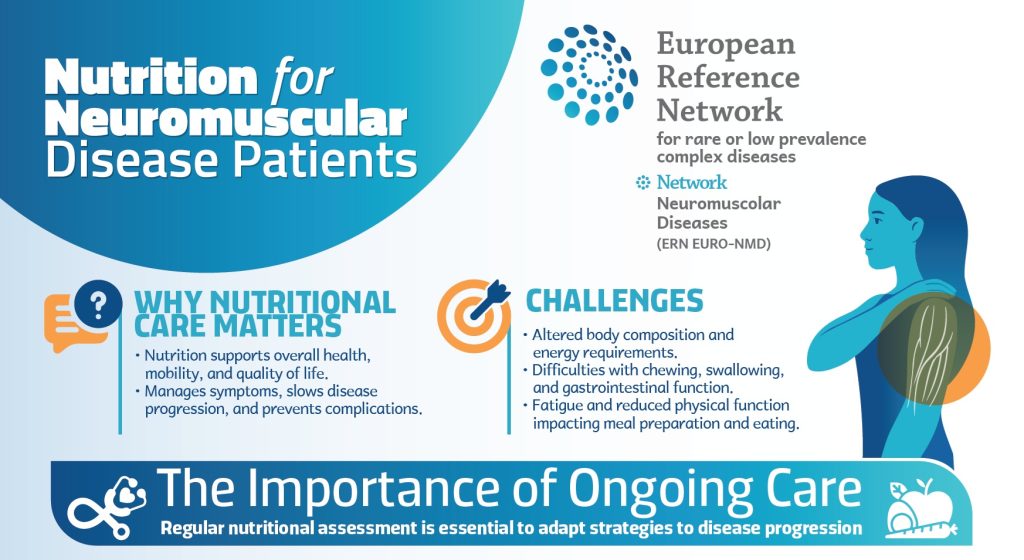New Initiative Highlights the Critical Role of Nutrition for People with Charcot-Marie-Tooth Disease
The European Reference Network for Neuromuscular Diseases (ERN EURO-NMD) has launched a new initiative emphasizing the vital role of nutritional care for individuals living with neuromuscular diseases (NMDs), including Charcot-Marie-Tooth (CMT) disease. A comprehensive flyer has been released to provide a practical guide for patients, caregivers, and healthcare professionals, outlining the importance of regular nutritional assessment and management.
For those with CMT, this initiative is particularly relevant. While CMT is primarily a neurological disorder, its impact on muscle strength and mobility can create significant nutritional challenges. Weight gain, for instance, is a common concern. Reduced physical activity due to muscle weakness and fatigue can lead to an increase in weight, which in turn places additional strain on already weakened muscles and joints, potentially exacerbating symptoms.
Which are the Nutrition/Lifestyle recommendations for CMT patients?
The new flyer from ERN EURO-NMD provides a framework for addressing these challenges, which aligns with the specific needs of the CMT community. The core components of the initiative include:
- Screening and Monitoring: Regular monitoring of weight and nutritional status is crucial. For individuals with CMT, this can help in early identification of weight changes and allow for timely intervention.
- Evaluation and Diagnosis: The initiative calls for a thorough evaluation of factors that can affect nutritional intake. While severe swallowing difficulties (dysphagia) are less common in CMT than in many other NMDs, they can affect individuals with certain forms of the disease, making this evaluation crucial. Furthermore, the flyer highlights the need to address contributing factors like respiratory issues. This is particularly pertinent as some types of CMT can lead to breathing difficulties, including sleep apnea, which can exacerbate fatigue and impact overall health and nutritional status.
- Management Strategies: The flyer offers tailored strategies for managing both malnutrition and overweight. For overweight individuals, it recommends balanced meal plans and tailored physical activity. This is particularly important for the CMT community, where maintaining a healthy weight is key to preserving mobility and quality of life. A balanced diet rich in fruits, vegetables, lean proteins, and complex carbohydrates is recommended, while minimizing salt, fat, and sugar.
- Additional Nutrition-Related Concerns: The initiative also addresses metabolic and gastrointestinal issues. For CMT, a diet that helps manage inflammation may be beneficial. Foods with anti-inflammatory properties, such as green leafy vegetables, berries, salmon, and walnuts, could be a valuable addition to the diet.
- Communication and Support: A collaborative approach between patients, caregivers, and a multidisciplinary healthcare team is emphasized. This ensures that the nutritional plan is tailored to the individual’s specific needs and abilities.
This flyer serves as a valuable resource for the CMT community. It provides clear, actionable steps to integrate nutritional care into the overall management of the disease. By focusing on a healthy, balanced diet and maintaining an appropriate weight, individuals with CMT can better manage their symptoms, support their overall health, and improve their quality of life.





